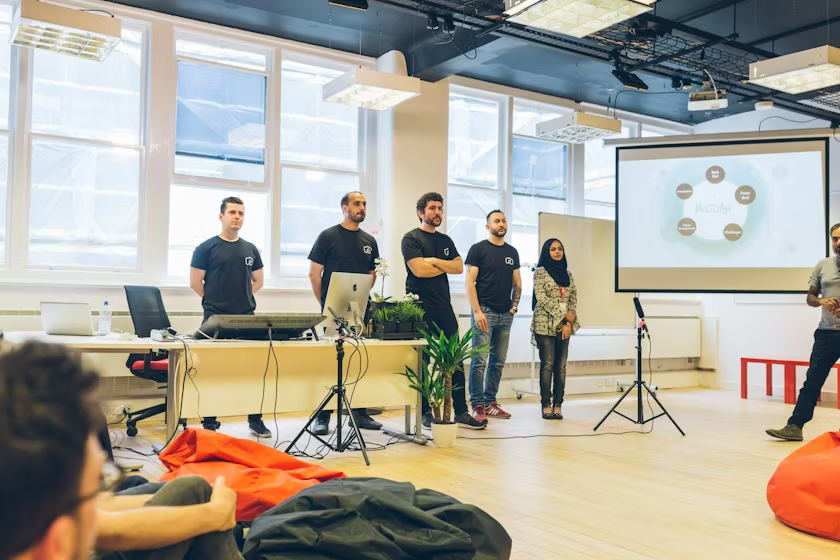Cloud Engineering is a field that merges software development, IT operations, and cloud infrastructure management to enhance and automate the software development process. It has emerged as a highly sought-after skill set in the tech industry, leading us to introduce a new Cloud Engineering Course for beginners looking to acquire the necessary skills to become proficient cloud engineers.
What is a Cloud Engineer?
A Cloud Engineer (also known as a Cloud Platform Engineer) is responsible for automating and optimising the software development process within cloud environments. They collaborate with software developers and IT operations staff to design, deploy, and maintain software applications in the cloud.
Cloud engineers use a variety of tools and techniques to automate the software development process and ensure that software applications are delivered swiftly and reliably.
Their roles and responsibilities may include:
- Automating the software development process using various tools and techniques
- Collaborating with software developers and IT operations staff to design and deploy software applications in the cloud
- Ensuring that software applications are delivered swiftly and reliably
- Designing and implementing Continuous Integration / Continuous Delivery (CI/CD) pipelines for cloud-based applications
- Monitoring and maintaining software applications to guarantee their availability and reliability
- Troubleshooting and resolving issues with software applications and cloud infrastructure, ensuring that security and compliance requirements are met
How to become a Cloud Engineer
To become a cloud engineer, you need a strong understanding of software development, IT operations, and the tools and techniques used in cloud environments. The Northcoders Cloud Engineering Course is designed to provide students with a comprehensive understanding of principles and practices, as well as hands-on experience with the tools and technologies used in the field.
The course covers a variety of topics, including:
- Cloud computing: Students will learn about cloud computing concepts and how they relate to servers and cloud providers like AWS. They will gain awareness of cloud services, interaction choices, and key concepts.
- Infrastructure as code: Using infrastructure as code tooling, students will learn to create servers and infrastructure within cloud environments. They will write code to create servers and services and learn considerations for designing for the cloud, such as regions, availability zones, and designing for failure.
- Application deployment: Students will understand and create their own Kubernetes cluster. They will operate this cluster and deploy applications in the form of Docker containers. The course also covers automating the deployment through Continuous Integration / Continuous Delivery (CI/CD) tools and monitoring and observability of those applications.
- Project week: This is where students apply everything they have learned to deploy a set of applications in their cloud environment. Using all the previous skills, they will create servers and services, build and deploy applications, and set up monitoring for when the applications are running.
Cloud Engineer Career Paths
It’s a rapidly growing field, and there are many career paths available for those who wish to pursue a career in this area. As a cloud engineer, you could find yourself working for a variety of different companies in a range of industries, including finance, healthcare, e-commerce, and technology.
One of the most common career paths for cloud engineers is to start as a junior cloud engineer or cloud engineering intern, working under the supervision of more experienced engineers. From there, you can work your way up to a senior cloud engineer or cloud architect role, which typically involves leading cloud engineering projects and managing teams of engineers.
Another potential career path for cloud engineers is to specialise in a specific area of cloud engineering, such as infrastructure as code, containerisation, or continuous integration and delivery (CI/CD). This can involve developing expertise in a specific tool or technology, such as Kubernetes or Docker, and becoming a subject matter expert in that area.
Overall, the career opportunities for cloud engineers are varied and exciting, and the demand for skilled engineers is only going to grow in the coming years. With the right training and experience, you can build a successful and rewarding career in this field.
What industries need Cloud Engineers?
In terms of industries, nearly every company can benefit from Cloud Engineer practices, from small startups to large enterprises. The financial sector, for example, relies heavily on technology to manage their operations, and Cloud Engineers can help them to ensure the smooth and secure delivery of their services. In healthcare, Cloud Engineers can help to ensure the reliability and security of medical software and systems. E-commerce companies can use Cloud Engineers to improve their website and app performance and increase their online sales.
In the technology industry, Cloud engineering is already widely adopted and is becoming an essential part of software development and delivery. Tech companies of all sizes, from startups to global giants like Amazon and Google, rely heavily on it to deliver their software products quickly and efficiently.
Becoming a Cloud engineer requires a strong understanding of software development, IT operations, and the tools and techniques used, and the Northcoders Cloud Engineer Course is designed to provide students with the necessary skills and knowledge to kick start their careers. See our Cloud Engineer bootcamp page for more information

Cloud Engineering Course for Beginners in 2023
Cloud Engineering is a field that merges software development, IT operations, and cloud infrastructure management to enhance and automate the software development process. It has emerged as a highly sought-after skill set in the tech industry, leading us to introduce a new Cloud Engineering Course for beginners looking to acquire the necessary skills to become…

Everything You Need to Know About Preparing for the Entry Challenge
The Northcoders Entry Challenge is how we determine who to offer a place to on our course. We aren’t looking for ready-made coders, but for hard-working people with an interest and demonstrable ability for problem solving and learning new concepts quickly. What Will Happen When I Apply? Review. First, we’ll read your application and decide whether…
Passed the Halfway Mark on my Coding Bootcamp Journey
Student Katie Masters writes… 2022 Bootcamp starts After the long bank holiday weekend and lovely Christmas break, I started back at Northcoders to begin a new block learning all about backend software development – the structure and behind the scenes workings and data of a web server. I knew this involved databases and as I…

9 Questions You Should Ask Bootcamps Before Applying
The only way to find the best coding bootcamp for your career goals is to ask the right questions. Here are 9 essential questions you should ask bootcamps before you sign on the dotted line! 1. What percentage of your graduates find work as software developers? When it comes to hiring statistics, transparency matters. Are hiring stats readily…

Why I Chose to Retrain as a Software Developer at Northcoders
For the last three years I had been working in project management in the engineering and manufacturing sector. However, about 18 months ago I knew that I needed to make a change. I had come to realise that I was working in a job I didn’t enjoy, in a business sector I had no interest…

An algorithm for solving coding katas
At Northcoders we put huge emphasis on problem solving skills. Being a programmer is about solving problems with a specific toolset. In fact, building software can be thought of as composing lots of small solutions into one big one. From the very start of the application process, we encourage students to get stuck into problem…

The Start Of My Bootcamp
Northcoders student Judit wrote about her first few weeks with Northcoders. Find out more about her career change and time with us on her Dev.to blog. I was originally going to title this post “First Steps”. Forget about steps. Starting bootcamp was more like deep diving into a whirlpool but I couldn’t be happier. Northcoders‘s bootcamp…

Stats Don’t Lie: Why tech is THE industry to work in
Considering changing your career to work in tech? You’re not alone. Google Trends data suggests that people are searching more often for careers in tech, with a steep increase over the last 18 months. Although it’s great to hear all the good things about working in this industry, true coders like to put things in numbers! We’ve…

Northcoders Bootcamp Prices
Introducing Core and CareerPlus Options As one of the UK’s premier coding bootcamp providers, we’ve successfully helped over 2,000 people transition to new careers in tech. Our approach involves continually adapting our curriculum based on valuable feedback from both the tech industry and our students. We’ve learned that not everyone requires help from our career…